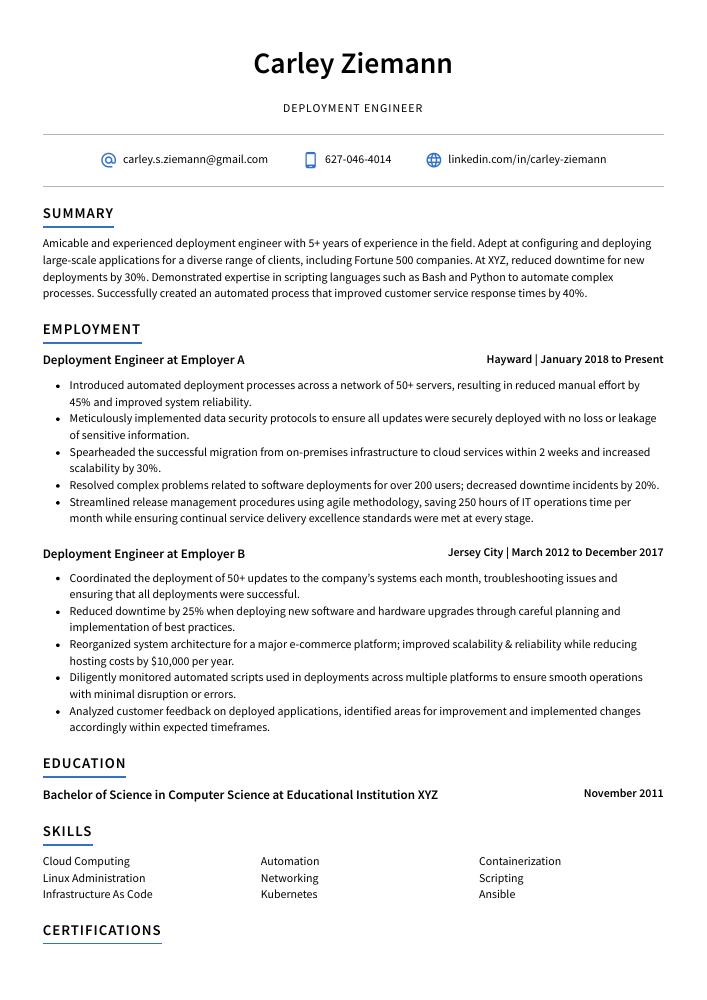Deployment Engineer Resume Guide
Deployment Engineers are responsible for deploying, configuring and managing computer systems. They ensure that applications or software packages are installed correctly on multiple devices, coordinate the deployment of new technologies in an organization’s IT infrastructure and provide technical support to end users when needed.
You have a knack for managing the deployment of IT systems, but employers may not know it. To get their attention and make them aware of your abilities, you must create an eye-catching resume that stands out from the crowd.
This guide will walk you through the entire process of creating a top-notch resume. We first show you a complete example and then break down what each resume section should look like.
Table of Contents
The guide is divided into sections for your convenience. You can read it from beginning to end or use the table of contents below to jump to a specific part.
Deployment Engineer Resume Sample
Carley Ziemann
Deployment Engineer
carley.s.ziemann@gmail.com
627-046-4014
linkedin.com/in/carley-ziemann
Summary
Amicable and experienced deployment engineer with 5+ years of experience in the field. Adept at configuring and deploying large-scale applications for a diverse range of clients, including Fortune 500 companies. At XYZ, reduced downtime for new deployments by 30%. Demonstrated expertise in scripting languages such as Bash and Python to automate complex processes. Successfully created an automated process that improved customer service response times by 40%.
Experience
Deployment Engineer, Employer A
Hayward, Jan 2018 – Present
- Introduced automated deployment processes across a network of 50+ servers, resulting in reduced manual effort by 45% and improved system reliability.
- Meticulously implemented data security protocols to ensure all updates were securely deployed with no loss or leakage of sensitive information.
- Spearheaded the successful migration from on-premises infrastructure to cloud services within 2 weeks and increased scalability by 30%.
- Resolved complex problems related to software deployments for over 200 users; decreased downtime incidents by 20%.
- Streamlined release management procedures using agile methodology, saving 250 hours of IT operations time per month while ensuring continual service delivery excellence standards were met at every stage.
Deployment Engineer, Employer B
Jersey City, Mar 2012 – Dec 2017
- Coordinated the deployment of 50+ updates to the company’s systems each month, troubleshooting issues and ensuring that all deployments were successful.
- Reduced downtime by 25% when deploying new software and hardware upgrades through careful planning and implementation of best practices.
- Reorganized system architecture for a major e-commerce platform; improved scalability & reliability while reducing hosting costs by $10,000 per year.
- Diligently monitored automated scripts used in deployments across multiple platforms to ensure smooth operations with minimal disruption or errors.
- Analyzed customer feedback on deployed applications, identified areas for improvement and implemented changes accordingly within expected timeframes.
Skills
- Cloud Computing
- Automation
- Containerization
- Linux Administration
- Networking
- Scripting
- Infrastructure As Code
- Kubernetes
- Ansible
Education
Bachelor of Science in Computer Science
Educational Institution XYZ
Nov 2011
Certifications
Certified Kubernetes Administrator (CKA)
Cloud Native
May 2017
1. Summary / Objective
Your resume summary should be an elevator pitch that quickly and concisely explains why you are the ideal candidate for a deployment engineer role. Include key skills such as experience with automation tools, knowledge of cloud infrastructure, and expertise in scripting languages. You could also mention any certifications or awards related to your work as well as how you have successfully implemented new systems at previous companies.
Below are some resume summary examples:
Professional deployment engineer with years of experience in automation, infrastructure provisioning, and cloud computing. Proven track record of deploying applications for large-scale web systems including backend services and databases. Skilled at delivering on time without sacrificing quality or security standards. Seeking to join ABC Tech as a deployment engineer to provide top-notch engineering solutions that are reliable, secure, and cost effective.
Talented deployment engineer with 5+ years of experience in automation, deployment, and release engineering. Experienced in developing high-quality software solutions using modern DevOps best practices. At XYZ Company, implemented a successful automated deployment pipeline that increased the stability and reliability of deployments by 40%. Skilled at troubleshooting complex issues while ensuring the highest levels of security for production environments.
Well-rounded deployment engineer with 8+ years of experience in the IT industry. Skilled at designing, deploying and maintaining systems infrastructure for large-scale projects. Expertise lies in leveraging scripting tools to automate routine tasks and guarantee uptime while overseeing software deployments across multiple platforms. Looking to join ABC as a Senior Deployment Engineer to drive successful system updates on an enterprise level.
Proficient deployment engineer with 5+ years of experience creating, deploying and maintaining applications in a variety of IT environments. Seeking to leverage expertise in troubleshooting, system optimization and automation scripting to join ABC Tech as the lead deployment engineer for their cloud-based solutions. Previously reduced resolution time by 40% through proactive monitoring and improved customer satisfaction ratings by 19%.
Reliable deployment engineer with 8+ years of experience in software deployment, configuration, and maintenance for a variety of applications. At XYZ Inc., managed deployments for 20+ systems across multiple networks and servers. Leveraged scripting to automate processes within the team’s environment; increased efficiency by 30%. Proven ability to troubleshoot issues quickly while maintaining high-level customer satisfaction ratings.
Seasoned deployment engineer with 8+ years of experience in deploying, configuring and managing all components of enterprise-level IT infrastructure. Experienced in creating automation scripts to reduce manual effort and improve system reliability. At ABC Corporation, improved product delivery time by 30% by developing a custom deployment tool. Proven track record of successful implementations across multiple organizations.
Skilled deployment engineer with 5+ years of experience in network design, deployment and maintenance. Highly proficient in deploying applications on cloud-based environments and managing multiple systems across different locations. At XYZ Company, managed over 200 servers for 15 global clients while meeting 99% uptime SLAs. Received two awards from the company’s CEO for successful deployments under tight deadlines.
Dependable deployment engineer with 8 years of experience in deploying and managing complex systems for large-scale enterprises. Proven ability to troubleshoot, monitor, and maintain production environments. Skilled at optimizing processes to improve scalability and reliability while reducing cost by 23%. Aiming to join ABC Tech as a deployment engineer where I can leverage my expertise in system automation.
2. Experience / Employment
For the experience section, you should list your employment history in reverse chronological order, with the most recent job listed first.
When writing about what you did for each role, use bullet points to make it easier for the reader to take in the information quickly. You want to include detail and results-oriented statements when possible. For example, instead of saying “Deployed applications,” you could say, “Successfully deployed 20+ applications across multiple cloud environments within a two-week period.”
To write effective bullet points, begin with a strong verb or adverb. Industry specific verbs to use are:
- Installed
- Configured
- Monitored
- Automated
- Optimized
- Troubleshot
- Implemented
- Upgraded
- Documented
- Analyzed
- Resolved
- Tested
- Managed
- Deployed
- Secured
Other general verbs you can use are:
- Achieved
- Advised
- Assessed
- Compiled
- Coordinated
- Demonstrated
- Developed
- Expedited
- Facilitated
- Formulated
- Improved
- Introduced
- Mentored
- Participated
- Prepared
- Presented
- Reduced
- Reorganized
- Represented
- Revised
- Spearheaded
- Streamlined
- Structured
- Utilized
Below are some example bullet points:
- Upgraded and deployed over 300 applications in a distributed environment, reducing deployment time by 25%.
- Documented and maintained configuration standards for software deployments across 10 different networks; identified potential issues before they occurred.
- Managed the installation of system updates and security patches to ensure compliance with industry standards; successfully reduced risk exposure by 45% over 6 months.
- Successfully implemented automation scripts to streamline various aspects of the deployment process, leading to an increase in overall efficiency by 50%.
- Implemented containerization technologies (e.g., Docker) for application deployments on cloud-based platforms such as AWS/Azure; decreased operational costs by 30% in 3 months’ time frame.
- Tested and deployed over 50 new software and hardware solutions, resulting in a 20% decrease in downtime.
- Installed numerous system updates on diverse network systems while adhering to strict corporate guidelines; successfully completed all projects within budget constraints.
- Confidently worked with senior-level engineers to develop innovative deployment strategies for complex infrastructures, saving the company $15,000 annually in labor costs.
- Participated in designing cost-effective applications for various clients’ networks that increased productivity by 40%.
- Improved overall security measures of different systems through periodic audits and comprehensive risk analysis activities; identified & fixed vulnerabilities before they caused any damage or disruption of services.
- Facilitated the deployment of over 500 software applications in a fast-paced environment, achieving an average success rate of 95%.
- Secured the stability and reliability of all deployed services by actively monitoring server performance stats and responding promptly to any issues as they arose.
- Actively collaborated with other engineers during deployments to ensure successful installations; achieved 100% customer satisfaction on 20+ projects within the last year alone.
- Achieved cost savings of $50,000 per quarter through proactive optimization of existing systems & infrastructure for better resource utilization without compromising service quality or availability.
- Optimized overall efficiency by automating routine tasks such as patching, configuration management and health checks using scripting languages like Python & Bash Scripts; improved response time from 48 hours to 24 hours on average for critical operations requests/issues resolution process.
- Deployed and maintained IT infrastructure for over 500 users in 5 office locations, resulting in a 15% increase in system stability.
- Monitored and optimized performance of all deployed systems using advanced scripting tools; successfully reduced downtime by 25%.
- Reliably configured networks, databases and servers to ensure optimal flow of information across the organization; achieved 99% uptime last year with no disruption to services.
- Configured hardware and software components as per client requirements while ensuring complete compliance with industry standards; completed projects within budget on average 10 days ahead of schedule.
- Troubleshot technical issues quickly & efficiently through root cause analysis techniques, resolving 50+ customer queries within 24 hours every week on average.
- Expedited the deployment of network applications and services for 25+ clients, reducing average delivery time by 40%.
- Presented innovative solutions to improve existing processes and systems, resulting in a 12% increase in efficiency across all deployments.
- Advised 10 team members on best practices when deploying software packages and resolved any issues encountered during the process; improved communication between teams by 30%.
- Developed new procedures to streamline the installation of operating systems on servers with zero downtime or data loss; enabled faster roll-out times for up to 50 machines per day.
- Accurately documented customer configurations as part of onboarding activities which saved an estimated 200 hours over 3 months period due to reduced manual entry errors.
- Represented the IT department in deploying and testing new software applications for over 150 clients, ensuring each deployment was completed successfully with minimal disruption to business operations.
- Formulated automated scripts to streamline the installation process of applications on multiple servers; decreased manual labor involved by 30% while increasing efficiency by 25%.
- Utilized DevOps tools such as Chef and Puppet to automate system configuration tasks across distributed environments, enabling faster deployments without compromising stability or data integrity.
- Compiled detailed reports at the end of every project outlining key performance metrics like uptime percentages, resource utilization & security compliance scores; improved documentation accuracy rate from 60% to 90%.
- Substantially reduced downtime incidents related to application deployments through rigorous pre-deployment tests and post-installation checks, resulting in a 45% increase in customer satisfaction ratings.
- Resourcefully deployed and implemented new software upgrades on 500+ servers in four different data centers across two continents, eliminating manual processes and improving overall system performance by 32%.
- Automated the deployment process of critical patches to a large-scale enterprise network with 10,000 devices; ensuring all systems were compliant within 8 hours of release.
- Assessed current infrastructure for potential risks or security vulnerabilities before deploying any changes; identified over 20 areas that needed improvement and successfully executed mitigation plans without disruption to service availability.
- Demonstrated expertise in scripting languages such as Bash & Python when building custom tools/scripts for automating server deployments; reduced average deployment time from 4 days to 2 days per application instance.
- Prepared detailed technical documentation outlining step-by-step installation instructions for various applications used throughout the organization; enabled IT staff members to quickly resolve issues related to deployments without needing additional support from engineering teams.
- Structured and implemented software deployment processes for 10+ applications, achieving 30% shorter time-to-market and reducing costs by $4,500.
- Mentored junior team members in server configuration and automation scripting best practices; successfully trained 5 new engineers within 2 months of joining the team.
- Revised existing application deployment procedures to improve reliability by 50%, resulting in reduced downtime from 6 hours per month to less than 1 hour per quarter on average.
- Consistently monitored system performance metrics during deployments for proactive resolution of any issues; increased overall uptime from 90% to 99%.
3. Skills
Skill requirements will differ from one employer to the next; this can easily be ascertained from the job posting. Organization A may require experience with Kubernetes and Organization B may require knowledge of Chef.
It is essential to tailor the skills section of your resume for each job you are applying for because many employers use applicant tracking systems, which scan resumes for certain keywords before passing them on to a human.
Once listed here, it’s important that you also discuss these skills in more detail throughout other sections such as the summary or experience section so that recruiters can get an even better understanding of what makes you qualified.
Below is a list of common skills & terms:
- Ansible
- Automation
- Cloud Computing
- Containerization
- Continuous Integration/Continuous Delivery (CI/CD)
- Infrastructure As Code
- Kubernetes
- Linux Administration
- Networking
- Scripting
4. Education
Mentioning your education section on your resume will depend on how far along you are in your career. If you just graduated and have no prior experience, include an education section below your resume objective. However, if you have significant work experience to showcase, omitting the education section is perfectly fine.
If an education section is included, try to mention courses related to deployment engineering such as computer networks or systems administration that can give hiring managers a better understanding of the skillset you bring to the role.
Bachelor of Science in Computer Science
Educational Institution XYZ
Nov 2011
5. Certifications
Certifications are a great way to demonstrate your expertise in a certain field. They show potential employers that you have taken the time and effort to become certified in an area relevant to their job opening, which can make you stand out from other applicants.
Include any certifications related to the position on your resume as it will give hiring managers more confidence in your abilities and qualifications for the role.
Certified Kubernetes Administrator (CKA)
Cloud Native
May 2017
6. Contact Info
Your name should be the first thing a reader sees when viewing your resume, so ensure its positioning is prominent. Your phone number should be written in the most commonly used format in your country/city/state, and your email address should be professional.
You can also choose to include a link to your LinkedIn profile, personal website, or other online platforms relevant to your industry.
Finally, name your resume file appropriately to help hiring managers; for Carley Ziemann, this would be Carley-Ziemann-resume.pdf or Carley-Ziemann-resume.docx.
7. Cover Letter
Cover letters are an important part of any job application. They provide recruiters with more detailed information about who you are and why you’re the perfect fit for the role they’re looking to fill.
Cover letters usually consist of 2-4 paragraphs and should be tailored specifically to each individual job that you apply for. It is not always necessary to submit a cover letter, however it can help give your resume greater impact and make sure that your qualifications stand out from other applicants.
Below is an example cover letter:
Dear Roxanne,
I am writing to apply for the Deployment Engineer position at XYZ Corporation. With more than five years of experience in systems administration and a track record of successful deployments, I am confident I will be an asset to your team.
In my current role as Deployment Engineer at ABC Corporation, I manage all aspects of our company’s deployment process, from code releases to server updates. I have extensive experience with both on-premises and cloud-based infrastructure and have successfully implemented several large-scale projects. In addition, I regularly collaborate with developers, ops teams, and other stakeholders to ensure smooth deployments.
I am a strong communicator with excellent problem-solving skills. My ability to troubleshoot issues quickly and efficiently has helped me resolve many complex problems during my career. In addition, I have a proven track record of successful project management and always meet deadlines while maintaining a high level of quality.
I believe my skills and experience make me the perfect candidate for this position, and I look forward to contributing to your team’s success. Please find attached a copy of my resume for your review; if you have any questions or would like additional information about my qualifications, please do not hesitate to contact me at [your email address] or [your phone number]. Thank you for your time and consideration; I look forward to hearing from you soon!
Sincerely,
Carley
Deployment Engineer Resume Templates
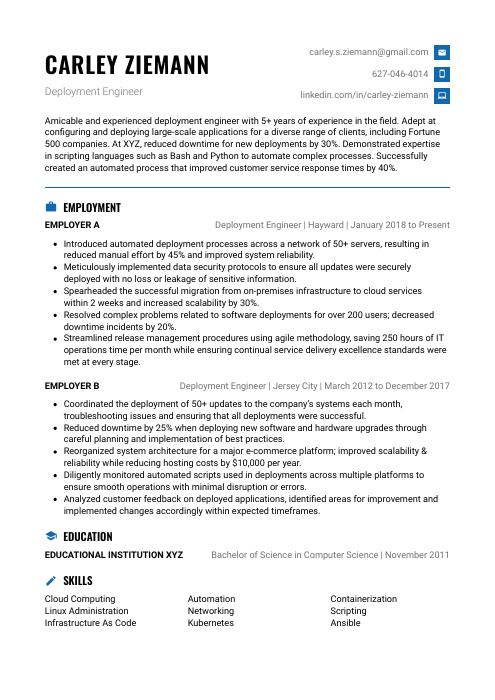 Echidna
Echidna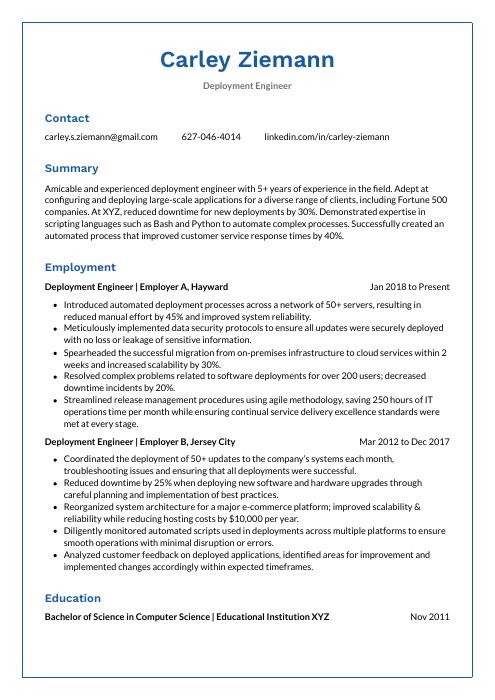 Markhor
Markhor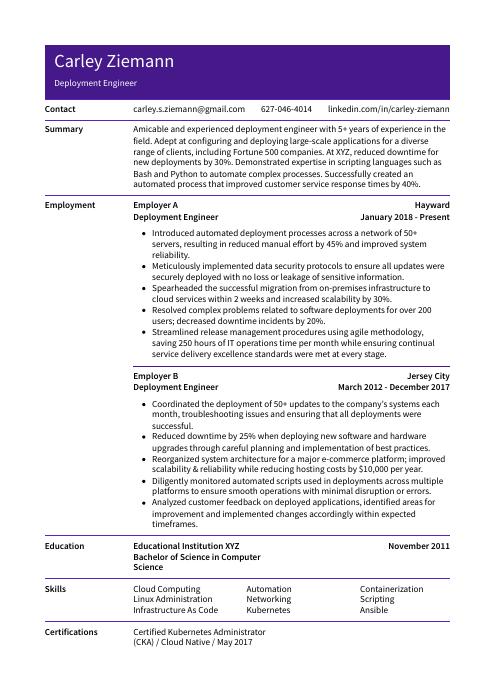 Pika
Pika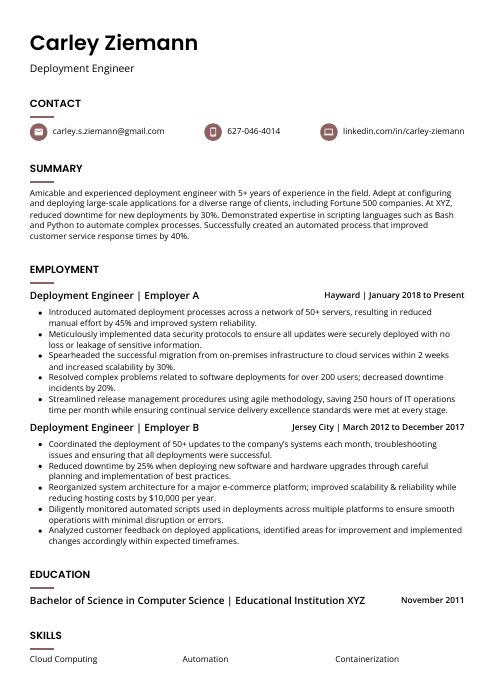 Fossa
Fossa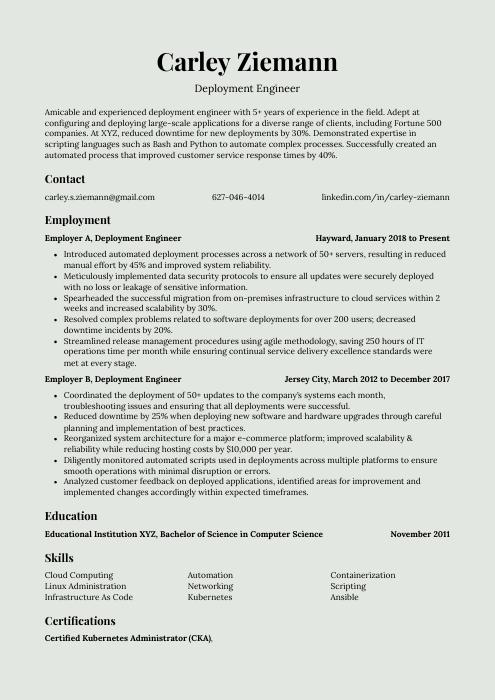 Saola
Saola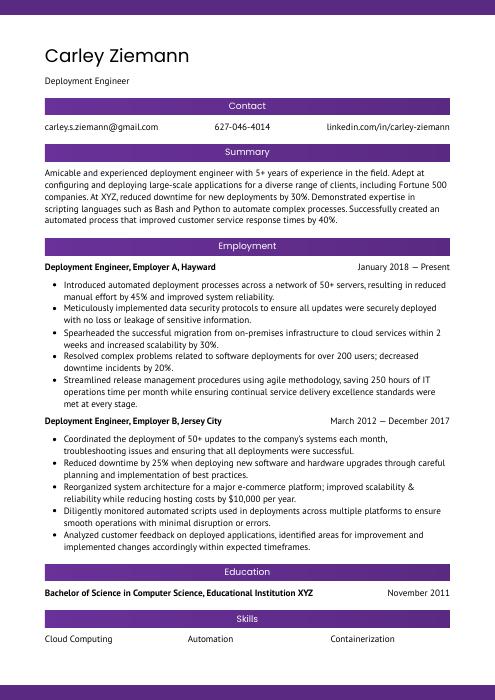 Jerboa
Jerboa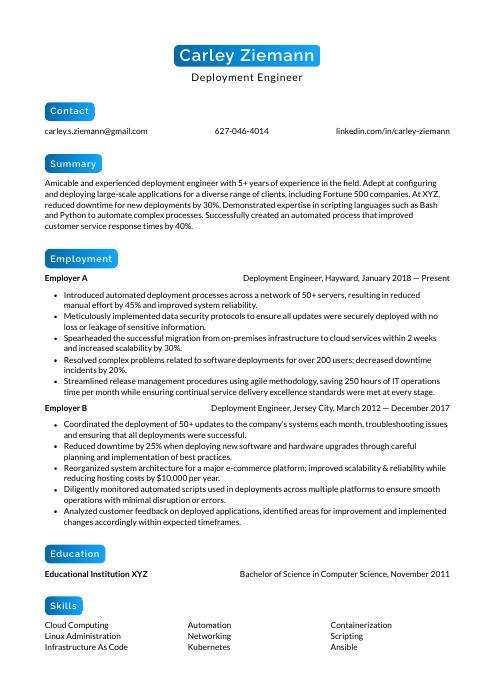 Kinkajou
Kinkajou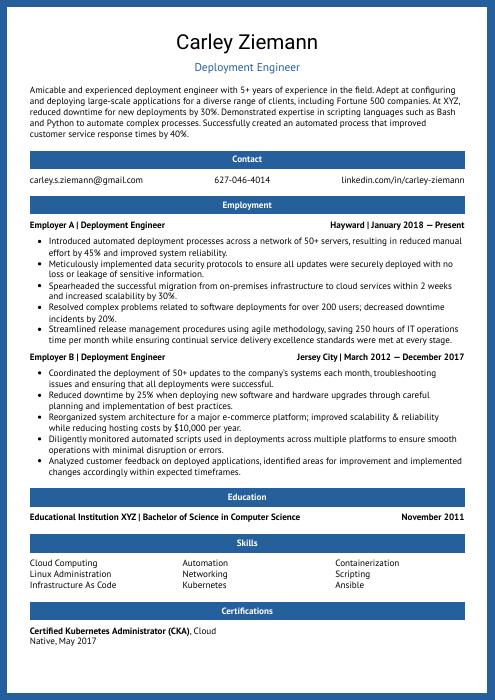 Ocelot
Ocelot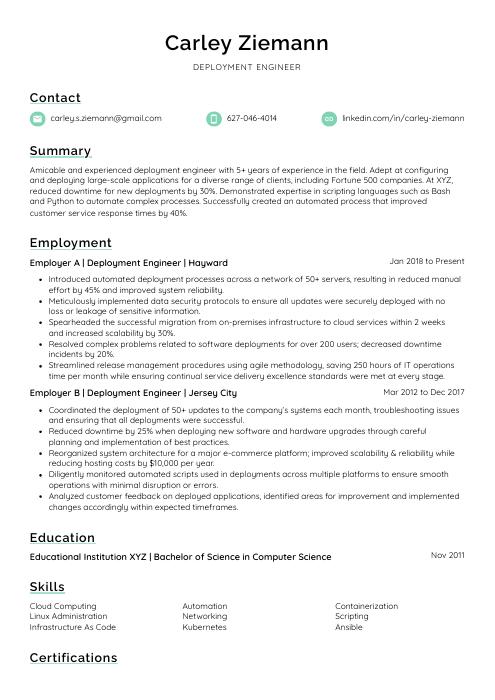 Lorikeet
Lorikeet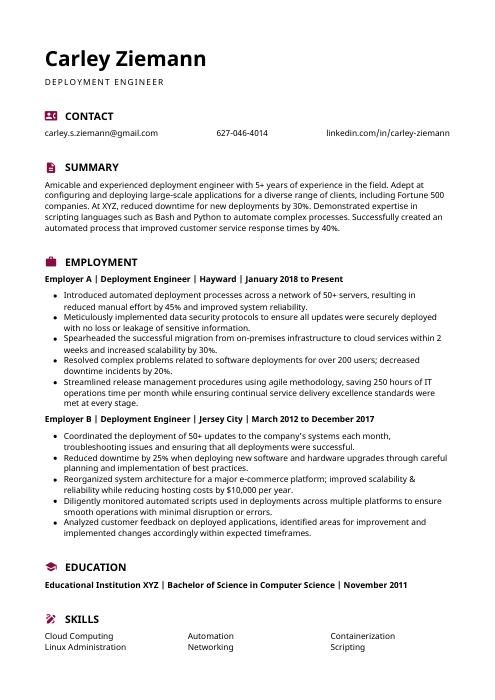 Hoopoe
Hoopoe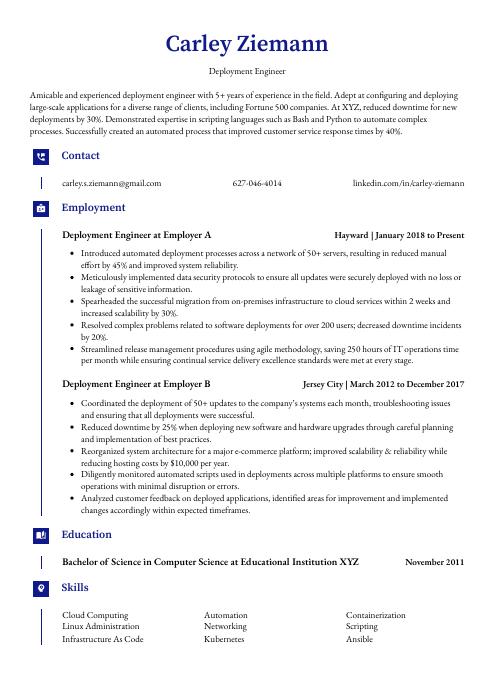 Gharial
Gharial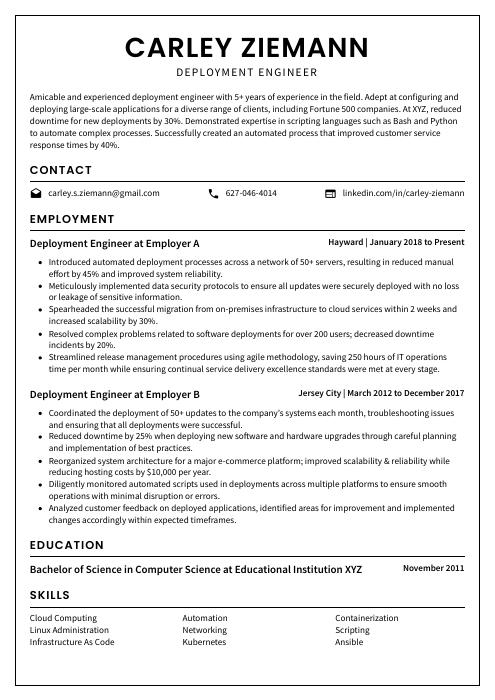 Cormorant
Cormorant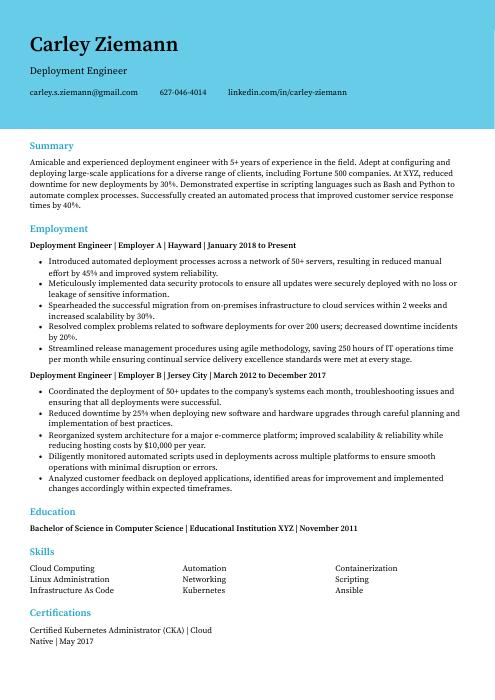 Dugong
Dugong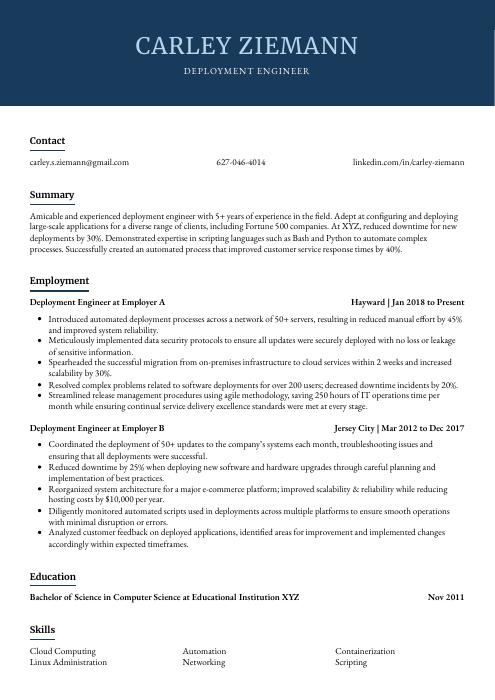 Bonobo
Bonobo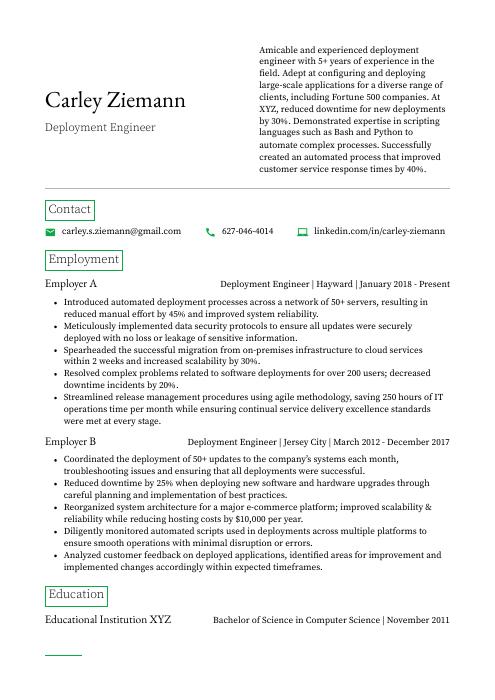 Quokka
Quokka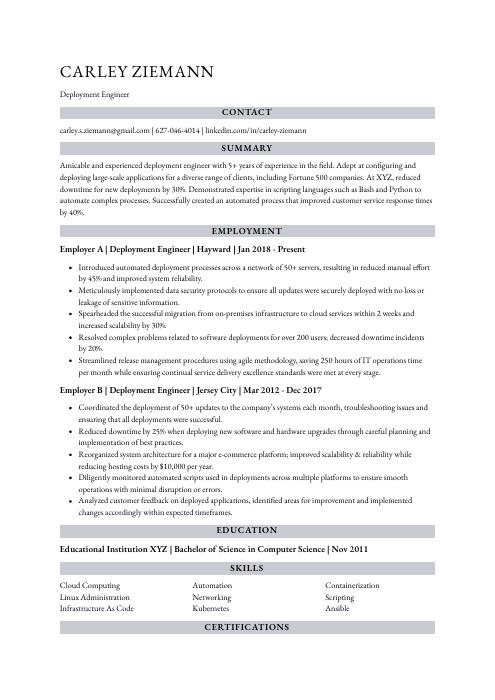 Numbat
Numbat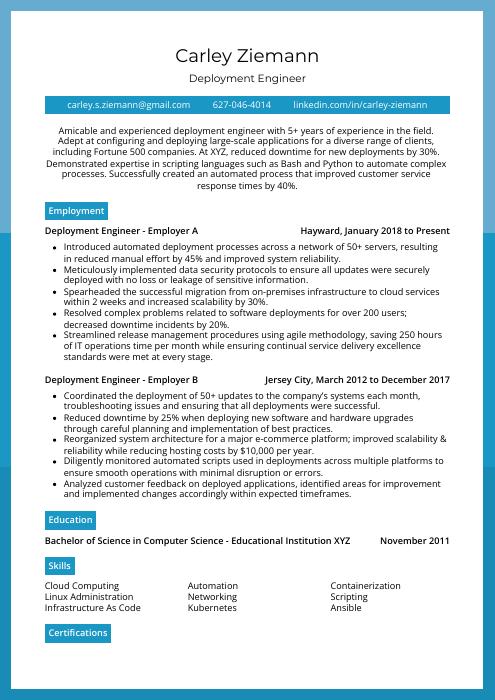 Rhea
Rhea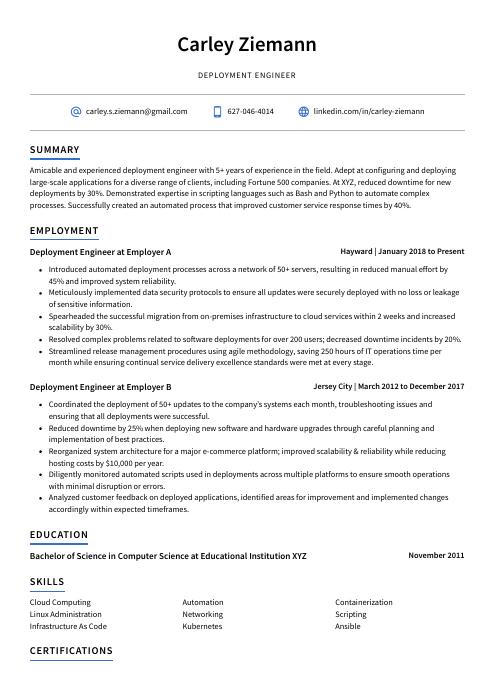 Axolotl
Axolotl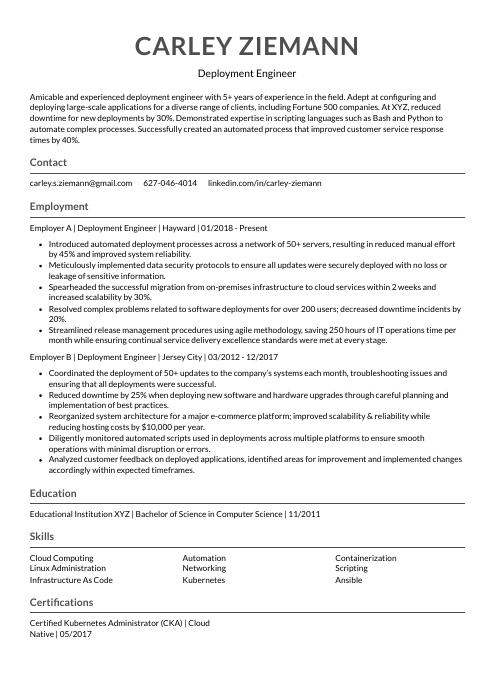 Indri
Indri Rezjumei
Rezjumei
